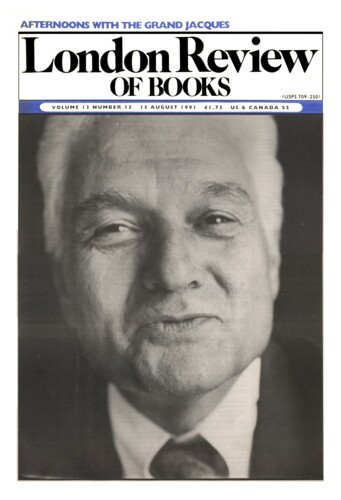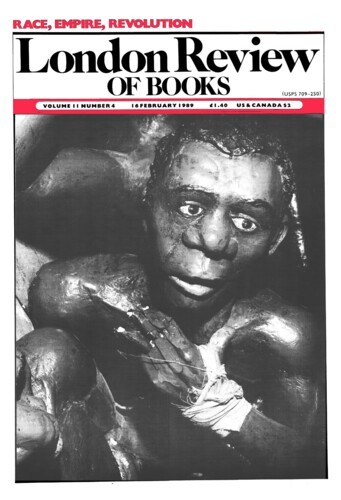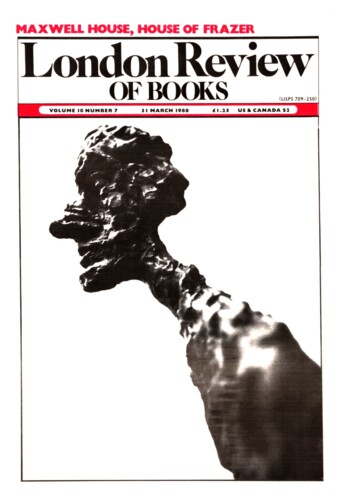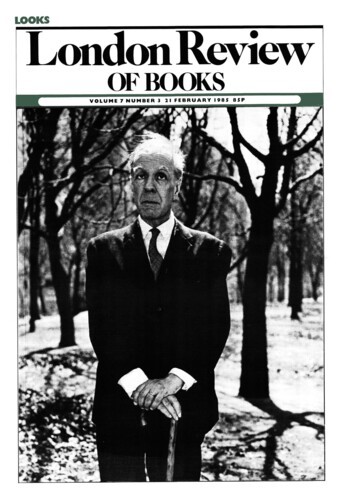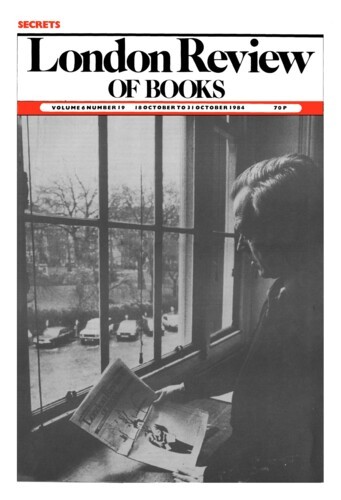Arthur Marwick
Arthur Marwick is Dean and Director of Arts and Professor of History at the Open University. Class and Image and Reality in Britain, France and the USA has recently been issued in paperback. British Society since 1945 will be reviewed here by David Marquand.
I could have fancied her
16 February 1989
Ex-King Coal
Arthur Marwick, 31 March 1988
‘You never seem to be able to get the numbers right in this industry,’ lamented Sir Norman Siddall, who bravely filled the gap between the Coal Board chairmanship of Sir Derek Ezra, supreme servant and subtle bureaucrat of consensus, and that of Sir Ian MacGregor, vieux terrible of confrontation. ‘There is either too much or too little.’ Not since 1913, in fact, have the figures seemed roughly right. Coal had been ancillary, rather than essential, to Britain’s early Industrial Revolution. Demand had fluctuated consideraoly throughout much of the 19th century, but by the end of that century it had achieved a crushing dominance as the source of heat, light and power, not just in Britain but in the expanding world economy: in 1913 coal provided 75 per cent of the world’s energy requirements, 99.5 per cent of Britain’s own. In that year the British coal industry produced 287 million tons, one-third of which was exported (much of it in the form of fuel for foreign steam ships), with the rest absorbed in industrial and domestic consumption; about 10 per cent of the world’s need for coal was met by Britain, whose coal exports made up 55 per cent of all coal traded internationally. Output fell during the First World War, and there were a number of crises as the Government sought desperately to maintain the coal supplies critical for the national war effort. The war over, it became clear that the world now had too much coal for its needs, that alternative fuels (particularly for shipping and transport) were widely available and usable, and that former British markets were not only producing their own coal supplies but offering them on the international market at prices which the British industry found difficulty in competing with. British coal then suffered a decline in production and employment so nicely paced, and a series of self-inflicted wounds so exquisitely contrived, that the Second World War and the period of reconstruction which followed were marked by one continuing crisis of productivity. Though some sort of stability was seemingly restored to a steadily shrinking industry, getting the numbers right continued to be difficult as oil resources fell and rose in accessibility and nuclear resources rose and fell in acceptability.
Diary: On Beauty
Arthur Marwick, 21 February 1985
Before my appointment to a visiting scholarship at the Hoover Institution on War, Revolution and Peace was confirmed I had to submit a synopsis of my proposed research. At that time my working title was ‘Physical Appearance and Life Chances in Modern Society’. Already before my departure in late October I had changed the latter phrase to ‘Life Experiences’, having worked out that while the good-looking arouse different responses from those encountered by the less well-favoured and thus have different opportunities and experiences, one cannot say that they are inevitably more successful. The matter was academic, in that my hosts clearly did not trouble to read my synopsis and simply appointed me on my record as a – let us put this as neutrally as possible – much-published social historian. While my immediate sponsors, anxious to foster research of the widest kind, have been most supportive, some embarrassment has been engendered by the open secret that the higher powers (the Hoover is, of course, best-known as President Reagan’s Think Tank) feel that serious studies of, say, the vices of Soviet foreign policy, or the virtues of monetarism, are to be preferred to such frivolities as human beauty. In the annual report just published my topic is officially designated as (oh magic word!) ‘élites’; my major public performance in ten days’ time will be on ‘The Upper Class in Britain, France and the USA since World War One’ (the argument, as it happens, will be that class is a far more useful category than élite). My paper on ‘Beauty and Ugliness in Western Society: The Social and Political Implications of Personal Appearance’ will be presented a little later within the confines of the (largely anti-Republican) History Department, where for the Winter Quarter, I am a visiting professor teaching a colloquium on 20th-century Britain.’
Boom
Arthur Marwick, 18 October 1984
‘With others of my own contemporaries,’ Denys Hay once wrote, ‘I certainly found myself in the years after 1945 still preoccupied with aspects of warfare in other times (in my case the later Middle Ages) which would not, I believe, have caught my attention if I had not experienced life between 1939 and 1945.’ Another distinguished Medieval and Renaissance scholar, Hans Baron, first sketched his thesis about the early Florentine Renaissance being triggered by the threat of invasion from other Italian states while he was in London during the Blitz. Medievalists have always been aware of war and society as a continuum: modern studies, however, for long remained remarkably resistant to the pervasive, if not cataclysmic resonances of war. The first serious study of 20th-century Britain, Charles Loch Mowat’s Britain between the Wars (1955), neatly managed, as the title indicates, to steer between the century’s two total wars. Liberal British historians found wars very nasty and preferred either to avoid them altogether or to keep them in carefully compartmentalised sections of their books. How far things have changed can be seen from the title of Max Beloff’s Wars and Welfare: Britain 1914-1945, an excellent textbook, if you like that sort of thing, of political and diplomatic history.
Pieces about Arthur Marwick in the LRB
I could have fancied her
Angela Carter, 16 February 1989
Back in the Sixties, a decade which evidently I enjoyed rather more than did your contributor, Janet Watts (LRB, 8 December 1988), Kenneth Clark published a contribution to art history called The...
For ever Walsall
Angus Calder, 21 March 1985
There are, of course, purely academic reasons for fresh syntheses of modern British history. The accumulation of new specialist studies must sooner or later compel wholesale revisions of the...
History’s Revenges
Peter Clarke, 5 March 1981
It is doubly true these days that the experts are the last people we can rely on. We rely on them because the compartmentalisation of knowledge in every field means that they are the only guides...
Read anywhere with the London Review of Books app, available now from the App Store for Apple devices, Google Play for Android devices and Amazon for your Kindle Fire.
Sign up to our newsletter
For highlights from the latest issue, our archive and the blog, as well as news, events and exclusive promotions.
